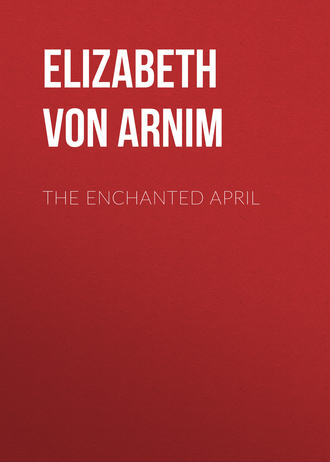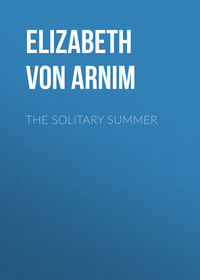 полная версия
полная версияThe Enchanted April
Mr. Briggs, San Salvatore's owner, had said, "You get out at Mezzago, and then you drive." But he had forgotten what he amply knew, that trains in Italy are sometimes late, and he had imagined his tenants arriving at Mezzago at eight o'clock and finding a string of flys to choose from.
The train was four hours late, and when Mrs. Arbuthnot and Mrs. Wilkins scrambled down the ladder-like high steps of their carriage into the black downpour, their skirts sweeping off great pools of sooty wet because their hands were full of suit-cases, if it had not been for the vigilance of Domenico, the gardener at San Salvatore, they would have found nothing for them to drive in. All ordinary flys had long since gone home. Domenico, foreseeing this, had sent his aunt's fly, driven by her son his cousin; and his aunt and her fly lived in Castagneto, the village crouching at the feet of San Salvatore, and therefore, however late the train was, the fly would not dare come home without containing that which it had been sent to fetch.
Domenico's cousin's name was Beppo, and he presently emerged out of the dark where Mrs. Arbuthnot and Mrs. Wilkins stood, uncertain what to do next after the train had gone on, for they could see no porter and they thought from the feel of it that they were standing not so much on a platform as in the middle of the permanent way.
Beppo, who had been searching for them, emerged from the dark with a kind of pounce and talked Italian to them vociferously. Beppo was a most respectable young man, but he did not look as if he were, especially not in the dark, and he had a dripping hat slouched over one eye. They did not like the way he seized their suit-cases. He could not be, they thought, a porter. However, they presently from out of his streaming talk discerned the words San Salvatore, and after that they kept on saying them to him, for it was the only Italian they knew, as they hurried after him, unwilling to lose sight of their suit-cases, stumbling across rails and through puddles out to where in the road a small, high fly stood.
Its hood was up, and its horse was in an attitude of thought. They climbed in, and the minute they were in—Mrs. Wilkins, indeed, could hardly be called in—the horse awoke with a start from its reverie and immediately began going home rapidly; without Beppo; without the suit-cases.
Beppo darted after him, making the night ring with his shouts, and caught the hanging reins just in time. He explained proudly, and as it seemed to him with perfect clearness, that the horse always did that, being a fine animal full of corn and blood, and cared for by him, Beppo, as if he were his own son, and the ladies must be alarmed—he had noticed they were clutching each other; but clear, and loud, and profuse of words though he was, they only looked at him blankly.
He went on talking, however, while he piled the suit-cases up round them, sure that sooner or later they must understand him, especially as he was careful to talk very loud and illustrate everything he said with the simplest elucidatory gestures, but they both continued only to look at him. They both, he noticed sympathetically, had white faces, fatigued faces, and they both had big eyes, fatigued eyes. They were beautiful ladies, he thought, and their eyes, looking at him over the tops of the suit-cases watching his every movement—there were no trunks, only numbers of suit-cases—were like the eyes of the Mother of God. The only thing the ladies said, and they repeated it at regular intervals, even after they had started, gently prodding him as he sat on his box to call his attention to it, was, "San Salvatore?"
And each time he answered vociferously, encouragingly, "Si, si— San Salvatore."
"We don't know of course if he's taking us there," said Mrs. Arbuthnot at last in a low voice, after they had been driving as it seemed to them a long while, and had got off the paving-stones of the sleep-shrouded town and were out on a winding road with what they could just see was a low wall on their left beyond which was a great black emptiness and the sound of the sea. On their right was something close and steep and high and black—rocks, they whispered to each other; huge rocks.
They felt very uncomfortable. It was so late. It was so dark. The road was so lonely. Suppose a wheel came off. Suppose they met Fascisti, or the opposite of Fascisti. How sorry they were now that they had not slept at Genoa and come on the next morning in daylight. "But that would have been the first of April," said Mrs. Wilkins, in a low voice. "It is that now," said Mrs. Arbuthnot beneath her breath.
"So it is," murmured Mrs. Wilkins.
They were silent.
Beppo turned round on his box—a disquieting habit already noticed, for surely his horse ought to be carefully watched—and again addressed them with what he was convinced was lucidity—no patois, and the clearest explanatory movements.
How much they wished their mothers had made them learn Italian when they were little. If only now they could have said, "Please sit round the right way and look after the horse." They did not even know what horse was in Italian. It was contemptible to be so ignorant.
In their anxiety, for the road twisted round great jutting rocks, and on their left was only the low wall to keep them out of the sea should anything happen, they too began to gesticulate, waving their hands at Beppo, pointing ahead. They wanted him to turn round again and face his horse, that was all. He thought they wanted him to drive faster; and there followed a terrifying ten minutes during which, as he supposed, he was gratifying them. He was proud of his horse, and it could go very fast. He rose in his seat, the whip cracked, the horse rushed forward, the rocks leaped towards them, the little fly swayed, the suit-cases heaved, Mrs. Arbuthnot and Mrs. Wilkins clung. In this way they continued, swaying, heaving, clattering, clinging, till at a point near Castagneto there was a rise in the road, and on reaching the foot of the rise the horse, who knew every inch of the way, stopped suddenly, throwing everything in the fly into a heap, and then proceeded up at the slowest of walks.
Beppo twisted himself round to receive their admiration, laughing with pride in his horse.
There was no answering laugh from the beautiful ladies. Their eyes, fixed on him, seemed bigger than ever, and their faces against the black of the night showed milky.
But here at least, once they were up the slope, were houses. The rocks left off, and there were houses; the low wall left off, and there were houses; the sea shrunk away, and the sound of it ceased, and the loneliness of the road was finished. No lights anywhere, of course, nobody to see them pass; and yet Beppo, when the houses began, after looking over his shoulder and shouting "Castagneto" at the ladies, once more stood up and cracked his whip and once more made his horse dash forward.
"We shall be there in a minute," Mrs. Arbuthnot said to herself, holding on.
"We shall soon stop now," Mrs. Wilkins said to herself, holding on. They said nothing aloud, because nothing would have been heard above the whip-cracking and the wheel-clattering and the boisterous inciting noises Beppo was making at his horse.
Anxiously they strained their eyes for any sight of the beginning of San Salvatore.
They had supposed and hoped that after a reasonable amount of village a mediaeval archway would loom upon them, and through it they would drive into a garden and draw up at an open, welcoming door, with light streaming from it and those servants standing in it who, according to the advertisement, remained.
Instead the fly suddenly stopped.
Peering out they could see they were still in the village street, with small dark houses each side; and Beppo, throwing the reins over the horse's back as if completely confident this time that he would not go any farther, got down off his box. At the same moment, springing as it seemed out of nothing, a man and several half-grown boys appeared on each side of the fly and began dragging out the suit-cases.
"No, no—San Salvatore, San Salvatore"—exclaimed Mrs. Wilkins, trying to hold on to what suit-cases she could.
"Si, si—San Salvatore," they all shouted, pulling.
"This can't be San Salvatore," said Mrs. Wilkins, turning to Mrs. Arbuthnot, who sat quite still watching her suit-cases being taken from her with the same patience she applied to lesser evils. She knew she could do nothing if these men were wicked men determined to have her suit-cases.
"I don't think it can be," she admitted, and could not refrain from a moment's wonder at the ways of God. Had she really been brought here, she and poor Mrs. Wilkins, after so much trouble in arranging it, so much difficulty and worry, along such devious paths of prevarication and deceit, only to be—
She checked her thoughts, and gently said to Mrs. Wilkins, while the ragged youths disappeared with the suit-cases into the night and the man with the lantern helped Beppo pull the rug off her, that they were both in God's hands; and for the first time on hearing this, Mrs. Wilkins was afraid.
There was nothing for it but to get out. Useless to try to go on sitting in the fly repeating San Salvatore. Every time they said it, and their voices each time were fainter, Beppo and the other man merely echoed it in a series of loud shouts. If only they had learned Italian when they were little. If only they could have said, "We wish to be driven to the door." But they did not even know what door was in Italian. Such ignorance was not only contemptible, it was, they now saw, definitely dangerous. Useless, however, to lament it now. Useless to put off whatever it was that was going to happen to them by trying to go on sitting in the fly. They therefore got out.
The two men opened their umbrellas for them and handed them to them. From this they received a faint encouragement, because they could not believe that if these men were wicked they would pause to open umbrellas. The man with the lantern then made signs to them to follow him, talking loud and quickly, and Beppo, they noticed, remained behind. Ought they to pay him? Not, they thought, if they were going to be robbed and perhaps murdered. Surely on such an occasion one did not pay. Besides, he had not after all brought them to San Salvatore. Where they had got to was evidently somewhere else. Also, he did not show the least wish to be paid; he let them go away into the night with no clamour at all. This, they could not help thinking, was a bad sign. He asked for nothing because presently he was to get so much.
They came to some steps. The road ended abruptly in a church and some descending steps. The man held the lantern low for them to see the steps.
"San Salvatore?" said Mrs. Wilkins once again, very faintly, before committing herself to the steps. It was useless to mention it now, of course, but she could not go down steps in complete silence. No mediaeval castle, she was sure, was ever built at the bottom of steps.
Again, however, came the echoing shout—"Si, si—San Salvatore."
They descended gingerly, holding up their skirts just as if they would be wanting them another time and had not in all probability finished with skirts for ever.
The steps ended in a steeply sloping path with flat stone slabs down the middle. They slipped a good deal on these wet slabs, and the man with the lantern, talking loud and quickly, held them up. His way of holding them up was polite.
"Perhaps," said Mrs. Wilkins in a low voice to Mrs. Arbuthnot, "It is all right after all."
"We're in God's hands," said Mrs. Arbuthnot again; and again Mrs. Wilkins was afraid.
They reached the bottom of the sloping path, and the light of the lantern flickered over an open space with houses round three sides. The sea was the fourth side, lazily washing backwards and forwards on pebbles.
"San Salvatore," said the man pointing with his lantern to a black mass curved round the water like an arm flung about it.
They strained their eyes. They saw the black mass, and on the top of it a light.
"San Salvatore?" they both repeated incredulously, for where were the suit-cases, and why had they been forced to get out of the fly?
"Si, si—San Salvatore."
They went along what seemed to be a quay, right on the edge of the water. There was not even a low wall here—nothing to prevent the man with the lantern tipping them in if he wanted to. He did not, however, tip them in. Perhaps it was all right after all, Mrs. Wilkins again suggested to Mrs. Arbuthnot on noticing this, who this time was herself beginning to think that it might be, and said no more about God's hands.
The flicker of the lantern danced along, reflected in the wet pavement of the quay. Out to the left, in the darkness and evidently at the end of a jetty, was a red light. They came to an archway with a heavy iron gate. The man with the lantern pushed the gate open. This time they went up steps instead of down, and at the top of them was a little path that wound upwards among flowers. They could not see the flowers, but the whole place was evidently full of them.
It here dawned on Mrs. Wilkins that perhaps the reason why the fly had not driven them up to the door was that there was no road, only a footpath. That also would explain the disappearance of the suit-cases. She began to feel confident that they would find their suit-cases waiting for them when they got up to the top. San Salvatore was, it seemed, on the top of a hill, as a mediaeval castle should be. At a turn of the path they saw above them, much nearer now and shining more brightly, the light they had seen from the quay. She told Mrs. Arbuthnot of her dawning belief, and Mrs. Arbuthnot agreed that it was very likely a true one.
Once more, but this time in a tone of real hopefulness, Mrs. Wilkins said, pointing upwards at the black outline against the only slightly less black sky, "San Salvatore?" And once more, but this time comfortingly, encouragingly, came back the assurance, "Si, si—San Salvatore."
They crossed a little bridge, over what was apparently a ravine, and then came a flat bit with long grass at the sides and more flowers. They felt the grass flicking wet against their stockings, and the invisible flowers were everywhere. Then up again through trees, along a zigzag path with the smell all the way of the flowers they could not see. The warm rain was bringing out all the sweetness. Higher and higher they went in this sweet darkness, and the red light on the jetty dropped farther and farther below them.
The path wound round to the other side of what appeared to be a little peninsula; the jetty and the red light disappeared; across the emptiness on their left were distant lights.
"Mezzago," said the man, waving his lantern at the lights.
"Si, si," they answered, for they had by now learned si, si. Upon which the man congratulated them in a great flow of polite words, not one of which they understood, on their magnificent Italian; for this was Domenico, the vigilant and accomplished gardener of San Salvatore, the prop and stay of the establishment, the resourceful, the gifted, the eloquent, the courteous, the intelligent Domenico. Only they did not know that yet; and he did in the dark, and even sometimes in the light, look, with his knife-sharp swarthy features and swift, panther movements, very like somebody wicked.
They passed along another flat bit of path, with a black shape like a high wall towering above them on their right, and then the path went up again under trellises, and trailing sprays of scented things caught at them and shook raindrops on them, and the light of the lantern flickered over lilies, and then came a flight of ancient steps worn with centuries, and then another iron gate, and then they were inside, though still climbing a twisting flight of stone steps with old walls on either side like the walls of dungeons, and with a vaulted roof.
At the top was a wrought-iron door, and through it shone a flood of electric light.
"Ecco," said Domenico, lithely running up the last few steps ahead and pushing the door open.
And there they were, arrived; and it was San Salvatore; and their suit-cases were waiting for them; and they had not been murdered.
They looked at each other's white faces and blinking eyes very solemnly.
It was a great, a wonderful moment. Here they were, in their mediaeval castle at last. Their feet touched its stones.
Mrs. Wilkins put her arm round Mrs. Arbuthnot's neck and kissed her.
"The first thing to happen in this house," she said softly, solemnly, "shall be a kiss."
"Dear Lotty," said Mrs. Arbuthnot.
"Dear Rose," said Mrs. Wilkins, her eyes brimming with gladness.
Domenico was delighted. He liked to see beautiful ladies kiss. He made them a most appreciative speech of welcome, and they stood arm in arm, holding each other up, for they were very tired, blinking smilingly at him, and not understanding a word.
Chapter 6
When Mrs. Wilkins woke next morning she lay in bed a few minutes before getting up and opening the shutters. What would she see out of her window? A shining world, or a world of rain? But it would be beautiful; whatever it was would be beautiful.
She was in a little bedroom with bare white walls and a stone floor and sparse old furniture. The beds—there were two—were made of iron, enameled black and painted with bunches of gay flowers. She lay putting off the great moment of going to the window as one puts off opening a precious letter, gloating over it. She had no idea what time it was; she had forgotten to wind up her watch ever since, centuries ago, she last went to bed in Hampstead. No sounds were to be heard in the house, so she supposed it was very early, yet she felt as if she had slept a long while—so completely rested, so perfectly content. She lay with her arms clasped round her head thinking how happy she was, her lips curved upwards in a delighted smile. In bed by herself: adorable condition. She had not been in a bed without Mellersh once now for five whole years; and the cool roominess of it, the freedom of one's movements, the sense of recklessness, of audacity, in giving the blankets a pull if one wanted to, or twitching the pillows more comfortably! It was like the discovery of an entirely new joy.
Mrs. Wilkins longed to get up and open the shutters, but where she was was really so very delicious. She gave a sigh of contentment, and went on lying there looking round her, taking in everything in her room, her own little room, her very own to arrange just as she pleased for this one blessed month, her room bought with her own savings, the fruit of her careful denials, whose door she could bolt if she wanted to, and nobody had the right to come in. It was such a strange little room, so different from any she had known, and so sweet. It was like a cell. Except for the two beds, it suggested a happy austerity. "And the name of the chamber," she thought, quoting and smiling round at it, "was Peace."
Well, this was delicious, to lie there thinking how happy she was, but outside those shutters it was more delicious still. She jumped up, pulled on her slippers, for there was nothing on the stone floor but one small rug, ran to the window and threw open the shutters.
"Oh!" cried Mrs. Wilkins.
All the radiance of April in Italy lay gathered together at her feet. The sun poured in on her. The sea lay asleep in it, hardly stirring. Across the bay the lovely mountains, exquisitely different in colour, were asleep too in the light; and underneath her window, at the bottom of the flower-starred grass slope from which the wall of the castle rose up, was a great cypress, cutting through the delicate blues and violets and rose-colours of the mountains and the sea like a great black sword.
She stared. Such beauty; and she there to see it. Such beauty; and she alive to feel it. Her face was bathed in light. Lovely scents came up to the window and caressed her. A tiny breeze gently lifted her hair. Far out in the bay a cluster of almost motionless fishing boats hovered like a flock of white birds on the tranquil sea. How beautiful, how beautiful. Not to have died before this . . . to have been allowed to see, breathe, feel this. . . . She stared, her lips parted. Happy? Poor, ordinary, everyday word. But what could one say, how could one describe it? It was as though she could hardly stay inside herself, it was as though she were too small to hold so much of joy, it was as though she were washed through with light. And how astonishing to feel this sheer bliss, for here she was, not doing and not going to do a single unselfish thing, not going to do a thing she didn't want to do. According to everybody she had ever come across she ought at least to have twinges. She had not one twinge. Something was wrong somewhere. Wonderful that at home she should have been so good, so terribly good, and merely felt tormented. Twinges of every sort had there been her portion; aches, hurts, discouragements, and she the whole time being steadily unselfish. Now she had taken off all her goodness and left it behind her like a heap in rain-sodden clothes, and she only felt joy. She was naked of goodness, and was rejoicing in being naked. She was stripped, and exulting. And there, away in the dim mugginess of Hampstead, was Mellersh being angry.
She tried to visualize Mellersh, she tried to see him having breakfast and thinking bitter things about her; and lo, Mellersh himself began to shimmer, became rose-colour, became delicate violet, became an enchanting blue, became formless, became iridescent. Actually Mellersh, after quivering a minute, was lost in light.
"Well," thought Mrs. Wilkins, staring, as it were, after him. How extraordinary not to be able to visualize Mellersh; and she who used to know every feature, every expression of his by heart. She simply could not see him as he was. She could only see him resolved into beauty, melted into harmony with everything else. The familiar words of the General Thanksgiving came quite naturally into her mind, and she found herself blessing God for her creation, preservation, and all the blessings of this life, but above all for His inestimable Love; out loud; in a burst of acknowledgment. While Mellersh, at that moment angrily pulling on his boots before going out into the dripping streets, was indeed thinking bitter things about her.
She began to dress, choosing clean white clothes in honour of the summer's day, unpacking her suit-cases, tidying her adorable little room. She moved about with quick, purposeful steps, her long thin body held up straight, her small face, so much puckered at home with effort and fear, smoothed out. All she had been and done before this morning, all she had felt and worried about, was gone. Each of her worries behaved as the image of Mellersh had behaved, and dissolved into colour and light. And she noticed things she had not noticed for years—when she was doing her hair in front of the glass she noticed it, and thought, "Why, what pretty stuff." For years she had forgotten she had such a thing as hair, plaiting it in the evening and unplaiting it in the morning with the same hurry and indifference with which she laced and unlaced her shoes. Now she suddenly saw it, and she twisted it round her fingers before the glass, and was glad it was so pretty. Mellersh couldn't have seen it either, for he had never said a word about it. Well, when she got home she would draw his attention to it. "Mellersh," she would say, "look at my hair. Aren't you pleased you've got a wife with hair like curly honey?"
She laughed. She had never said anything like that to Mellersh yet, and the idea of it amused her. But why had she not? Oh yes—she used to be afraid of him. Funny to be afraid of anybody; and especially of one's husband, whom one saw in his more simplified moments, such as asleep, and not breathing properly through his nose.
When she was ready she opened her door to go across to see if Rose, who had been put the night before by a sleepy maidservant into a cell opposite, were awake. She would say good-morning to her, and then she would run down and stay with that cypress tree till breakfast was ready, and after breakfast she wouldn't so much as look out of a window till she had helped Rose get everything ready for Lady Caroline and Mrs. Fisher. There was much to be done that day, settling in, arranging the rooms; she mustn't leave Rose to do it alone. They would make it all so lovely for the two to come, have such an entrancing vision ready for them of little cells bright with flowers. She remembered she had wanted Lady Caroline not to come; fancy wanting to shut some one out of heaven because she thought she would be shy of her! And as though it mattered if she were, and as though she would be anything so self-conscious as shy. Besides, what a reason. She could not accuse herself of goodness over that. And she remembered she had wanted not to have Mrs. Fisher either, because she had seemed lofty. How funny of her. So funny to worry about such little things, making them important.









